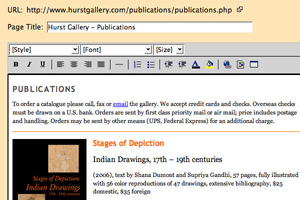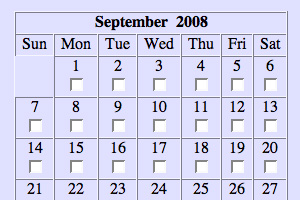Content Management Systems
Content management systems (CMS) allow clients to take charge of the regular maintenance of their website content, without having to rely upon technical personnel or requiring a knowledge of HTML. I have extensive experience producing lightweight CMSs which are tailored to clients’ specific needs, as well as with the implementation and customization of full-featured third-party systems.
Lightweight Custom Systems
Custom systems may serve to manage the content of an entire website, or may be tailored to maintain specific portions of a site.
Rich Text Editors

Systems for maintaining an entire website are built around an online rich text editor (RTE), which allows users to lay out formatted text and images with an interface similar to Microsoft Word. The RTE takes care of generating the HTML code which will display the content in the web page as the user has created it.
In my work I use Kevin Roth’s Cross-browser Rich Text Editor. To this I add tools to control other elements of the page (such as the title and decorative images), page navigation and archiving functions, and file uploads, as needed by the client. Content outside the “main” area of the page, such as sidebars, can be separately edited as well.
The result is a fast, efficient system that allows clients to manage the entire content of their website themselves. It does not allow control over the structure or the layout of the site – such changes will still require technical intervention to modify the site HTML code. However, unlike systems which do allow such complete control (like Dreamweaver), the learning curve for using a lightweight CMS like this is much easier.
My clients who use a lightweight custom CMS to maintain their sites include:
Database Editors
The database-backed systems I have built all include online interfaces for managing the database content. In some cases these include extensive data entry systems, as for Religious Diversity News and the Pluralism Project’s Profiles of Religious Centers. Other features of these include:
• Search functions
• Data review and approval functions
• Multi-user login and data ownership permissions
You may view a mock-up of the multi-tab data entry form for the Pluralism Project’s Profiles of Religious Centers.
Event Calendars

Another type of specialized content management is online event calendars. I have built custom calendar systems for Lowell House and Oxford Street Daycare Co-op; a mock-up of the Lowell House online submission form is also available.
Third-Party Systems
Many third-party systems are available which provide a wide range of options for managing one's website. I have experience working with a number of these, including making extensive modifications and additions to their “out-of-the-box” codebases:
• Movable Type
• Drupal
• Mambo